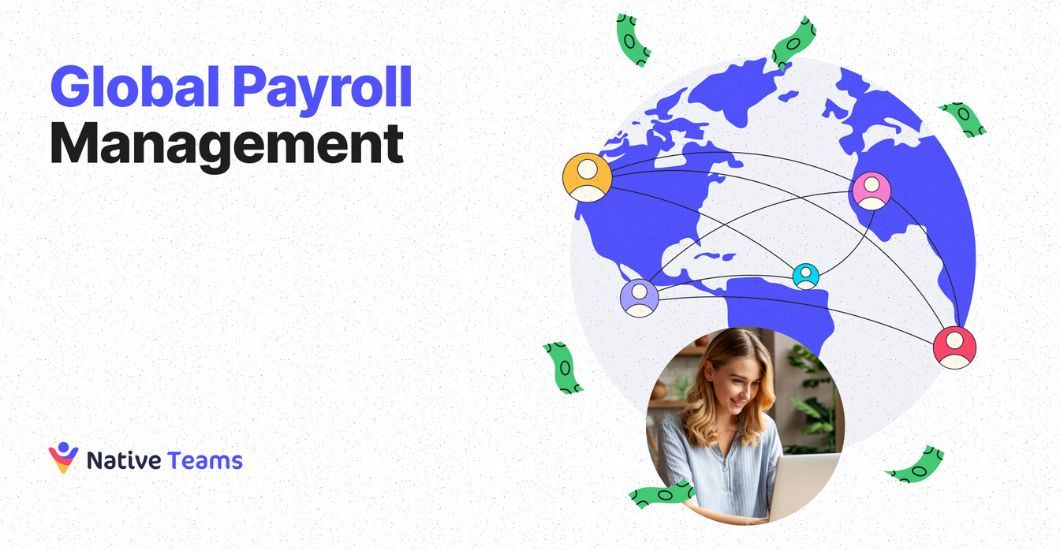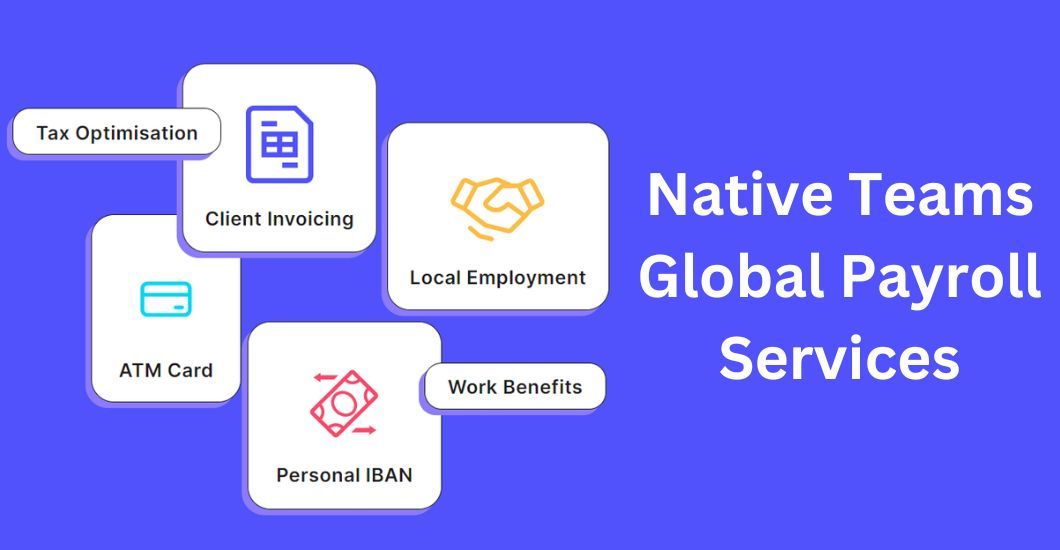Global Payroll Management
Global payroll management is among the most crucial aspects of every international business’s operations. However, managing global payroll during an international expansion can become quite a challenge.
In this guide, we will explore the most crucial points of managing global payroll, including the benefits, challenges, and best practices. Keep reading to gain valuable insights.

Understanding global payroll management
Global payroll management refers to the process of handling employee compensation, taxes, and compliance across different countries.
Global payroll differs from domestic payroll procedures because it involves navigating through complex local laws, tax frameworks, and currency fluctuations. Domestic payroll is mostly characterised by standardised processes, while global payroll requires a tailored approach for each country of operation.
How does global payroll work?
Global payroll works by centralising employee data, legal considerations, and different software systems or solutions to calculate and distribute payments in local currencies while ensuring full compliance.
As much as managing global payroll involves collaboration between HR and finance teams, many companies are also using the expertise of external partners who specialise in global payroll practices.
What are the benefits of global payroll?
Investing in a global payroll solution can be beneficial for more aspects of your business operations, as follows:
- Cost-efficiency – Global payroll solutions can streamline the entire process, contributing to cutting company costs and reducing administrative work.
- Compliance – Staying compliant with local laws and regulations and mitigating legal risks is a significant benefit of global payroll.
- Employee satisfaction – Global payroll ensures that a company’s employees are paid accurately and consistently regardless of their location, which fosters trust and employee satisfaction.
- Data security – Centralising global payroll into a single platform or solution imposes fewer risks of data breaches and enhances data security.
- Time-saving – Centralising payroll management also cuts the time spent on manual payroll tasks and frees up the company’s teams for other aspects of operations.

Challenges in global payroll management
Managing payroll on a global scale can impose a variety of challenges that demand careful consideration and expertise. In the section below, we’re presenting some of the most significant challenges global employers face.
1. Compliance with local laws
Global payroll involves adhering to each country’s set of laws and regulations, which vary from one country to another and can be complex to understand. Therefore, companies need to ensure that their global payroll practices are compliant to avoid legal issues and reputation damage.
2. Currency fluctuations
Currency fluctuations can have a significant impact on payroll costs, affecting the amounts that employees receive in their local currency. In addition to this, managing payroll costs becomes more complicated when multiple currencies are involved, which can lead to financial uncertainty for both the company and its employees.
3. Data security
Managing global payroll involves handling and transferring sensitive employee data such as personal information, salary details, and tax-related information across borders. Therefore, it’s of crucial importance to ensure that all the payroll data is protected from unauthorised access and breaches.
4. Administration
When it comes to managing administration, each country features unique administrative requirements, including forms, documentation, and reporting procedures. Managing such requirements in multiple countries can be complex and time-consuming and lead to legal consequences in case of inaccuracy.

Best practices for global payroll management
Managing payroll on a global level can be complex, especially when it comes to crucial payroll principles such as accuracy, transparency, and timely operations.
In the section below, we’re exploring some of the most essential practices that are crucial for establishing and managing an effective global payroll.
1. Centralisation and standardisation
Centralising payroll operations and standardising various procedures across different locations will ensure consistency, minimise potential errors, and simplify the management of payroll information. By managing global payroll within a single platform or software, global employers can establish better control, leading to enhanced accuracy.
2. Local expertise
Engaging local teams of tax and law experts is crucial for staying compliant with each country’s payroll laws and regulations. Using expert knowledge can provide every company with valuable insights into navigating complex local and international labour law and ensure accurate and compliant payroll processing.
3. Regular compliance audits
Conducting regular compliance audits is important to verify that the company’s payroll practices are aligned with local regulations and laws. Audits can help identify any discrepancies and reduce the risk of legal and financial issues.
4. Advanced global payroll solutions
Investing in advanced solutions for global payroll management will streamline complex payroll calculations and reporting. Such solutions are typically capable of handling multiple currencies, are equipped with up-to-date information and knowledge regarding laws and regulations, and provide tax reports and various documentation.

What are the responsibilities of global payroll?
In simplified terms, global payroll should ensure that a company’s employees are paid timely and accurately, regardless of their country, while also complying with specific local laws and regulations. In this section, we’re providing an overview of the key responsibilities of global payroll.
1. Data management
One of the main responsibilities of global payroll processing is to collect, maintain, and keep up with up-to-date employee data such as personal information, compensation details, bank account details, and tax-related information. Such employee data should always ensure accurate payroll processing.
2. Accurate calculations
Providing accurate calculations regarding employee salaries, tax withholdings, and different types of deductions is also among global payroll roles. Payroll calculations should always follow the country’s local rates and regulations.
3. Local law compliance
Global payroll should ensure that each process is compliant with labour laws, tax regulations, and reporting requirements in each country where the company has employees. Companies that are not adhering to local legal frameworks while processing payroll can face legal issues.
4. Payment processing
Global payroll also includes international employee payments. Payment processing should be aligned with both employee preferences and the local regulations of the country where they work.
5. Tax reporting
Payroll processing includes preparing and submitting payroll tax reports to the relevant tax authorities of each country of operation. For compliant tax reporting, it’s important to keep up with the required forms and formats and adhere to the specific deadlines set by the authorities.
6. HR integration
Global payroll should be integrated with other company HR systems to maintain data consistency and efficient data sharing regarding aspects such as employee benefits administration, employee management, and others.

10 Tips for choosing your global payroll provider
Choosing the right international payroll provider is a strategic decision that impacts every company’s global workforce management. The right provider should be able to streamline the entire payroll processing, all while ensuring full compliance and reducing administrative burdens.
In the section below, we’re giving 10 tips and considerations for choosing the right international payroll provider.
1. Global presence
Global payroll combines managing salaries, taxes, and compliance in multiple countries. Therefore, the right payroll provider for your company should have a global presence and expertise in all the countries where your employees work.
2. Compliance
Compliance with local laws is a top priority when handling global payroll. A good international payroll provider should be equipped with local teams of tax and law experts to provide knowledge and handle payroll compliance in each country, including tax withholdings, deductions, and reporting.
3. Technology and integration
Each global payroll provider has unique technology capabilities, and compatibility is essential for seamless collaboration and data exchange. Therefore, it’s important to assess whether a specific technology or platform can be integrated with your company’s existing HR systems or procedures to ensure efficient information flow and reduce manual data entry errors.
4. Data protection
Global payroll providers will collect sensitive employee data such as personal information, bank account details, and compensation details. Hence, it’s also crucial to ensure that the provider takes high data protection measures, such as adherence to data privacy regulations like GDPR and standards like ISO 9001 or 27001.
5. Scalability
Global expansion is a constant commitment that shouldn’t be hindered by the limitations of a global payroll provider. Therefore, a good international payroll solution should be flexible, easily scalable, and able to accommodate new payroll countries, an increasing number of employees, and growing service requirements without any hassles or complexities.
6. Reputation
Assessing a global payroll provider’s reputation will provide you with essential information about their performance, credibility, and sustainability for your business. Sources such as client references, case studies, testimonials and online reviews can provide first-hand insights into their reliability and help you make a strategic decision.
7. User experience
Global payroll providers should always prioritise user experience, providing software or platforms that are intuitive, easy to use, and flexible to accommodate specific companies’ needs. Therefore, companies should assess whether a specific provider offers convenient features and functionalities that streamline their daily workflow and payroll-related processes.
8. Cultural fit
Companies should also assess whether the specific payroll provider aligns with their company culture and values. Such alignment is important as global payroll providers take part in representing your company in foreign markets. A good cultural fit doesn’t only mean maintaining seamless operations, but it also contributes to positive employee relationships.
9. Customer support
Responsive customer support service is crucial for addressing payroll-related issues, inquiries, and concerns promptly, leading to maintaining smooth operations. Some aspects, such as fast response times and knowledgeable representatives, are indicators of a reliable payroll provider.
10. Other compatible services
Many global payroll providers offer other compatible services that can aid global expansion, including payment tools and options or Employer of Record services. Centralising expansion operations with a single provider is always recommended, as it provides a more streamlined approach to the daily workflow.

Native Teams’ global payroll solutions
With legal entities in 60+ countries around the world, Native Teams can help you run global payroll in full compliance with local laws and regulations. With our global payroll solutions, international employers can access a set of tools and features to streamline their global expansion process:
- Proper employment – Provide legal employment for your team members through Native Teams’ legal entities.
- Compliant contracts and documents – Provide employment contracts and other necessary documents customised according to specific country laws.
- Taxes, contributions, and benefits – Ensure that all your employee taxes, contributions, and employment benefits are accurately and promptly paid to the relevant authorities.
- Tax management – Optimise tax obligations and take advantage of allowances and deductions while staying compliant.
- Expense management – Track and manage expenses and costs for all your employees around the world.
- Native Teams card – Provide employees with a Native Teams card for simple and secure online and offline payments.

Summing up
Managing payroll on a global scale is one of the most crucial operations for every company that strives for global expansion. However, global payroll management can be quite challenging.
By following a couple of principles, such as timeliness, accuracy, and compliance, or using the services of a global payroll provider, global employers can ensure that they’re avoiding legal issues, reputation damage, and employee dissatisfaction.
